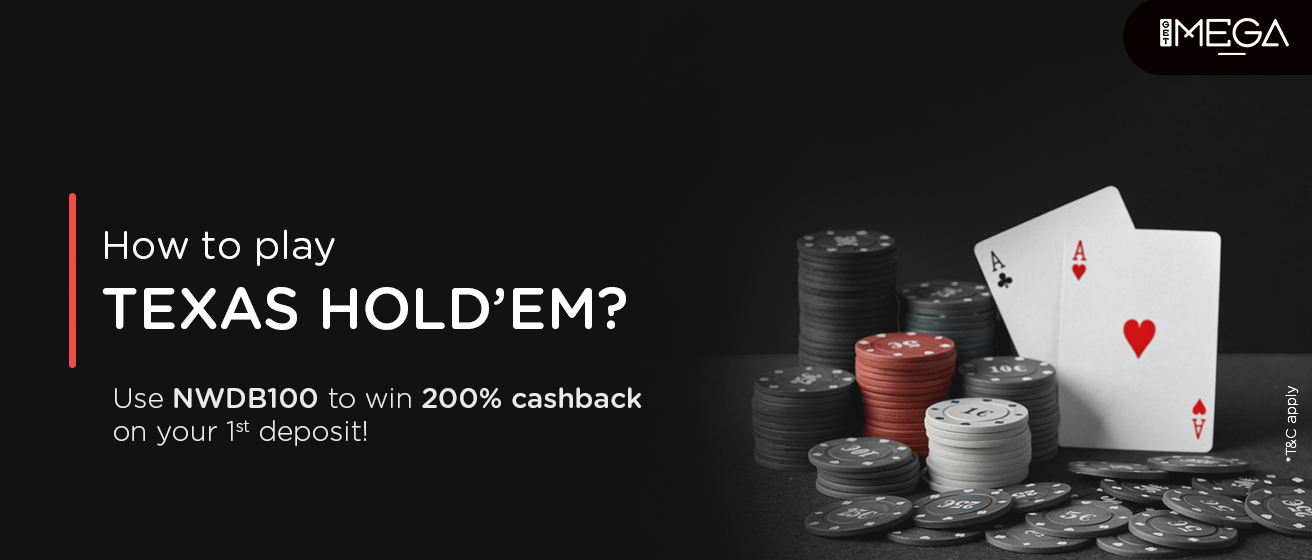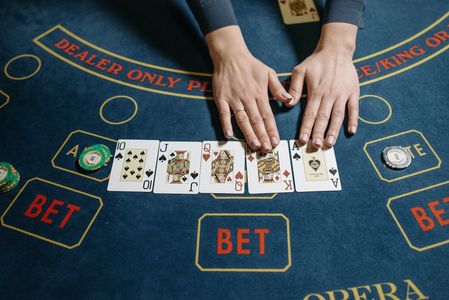How to Deal Texas Hold'em Poker - 5 Steps Guide

Table of content:
Have you ever been curious about Texas Hold'em, the popular poker variant seen in movies and casinos around the world? This game may seem complex at first glance, but the basic mechanics are surprisingly straightforward. Mastering the art of dealing Texas Hold'em Poker is essential for anyone looking to host a game or participate in one. With its blend of strategy, psychology, and chance, Texas Hold'em is one of the most popular variants of poker worldwide.
In this article, we'll walk you through the process of dealing Texas Hold'em Poker in five simple steps. From shuffling the deck to managing the betting rounds, each step plays a crucial role in ensuring a smooth and enjoyable gameplay experience.
GetMega Poker App is an amazing platform that lets you play poker with friends & family with real money. Sounds fun, isn't it? Download the GetMega Poker app now!
Discover the joy of playing poker India with us, offering a user-friendly platform that caters to the preferences of Indian players, creating a dynamic and entertaining gaming space.
Poker Dealer
In Texas Hold'em, the one responsible for dealing hole cards to each player and laying out the community cards on the board is known as a poker dealer. In addition, the dealer makes sure that the bets are being placed and the pot is managed thoroughly throughout the game to ensure that the game runs smoothly from one hand to another without any roadblocks.

There are also poker dealer tips that the dealer receives from the players. Although the tips are unnecessary, they are given and received in good sports.
Although this responsibility is given to one person, it can also shift from one person to another. This means that every poker player must know how to deal with poker cards and carry out the responsibility of being a dealer. One should know the game's basic structure to learn how to deal cards in poker.
Discover the nuances between Omaha Poker VS Texas Hold'em, two of the most popular variants in the poker world. While Texas Hold'em emphasizes community cards and strategic betting rounds, Omaha Poker introduces players to a higher level of complexity with its unique rule of four hole cards and specific hand requirements. Understanding the distinctions between these games can elevate your gameplay and decision-making prowess, helping you adapt your strategies and maximize your winning potential based on the dynamics of each variant.
What Does A Dealer Do In Texas Holdem?
Texas Hold'em is the most popular variation of poker in the world. Played in different marquee tournaments, this game is a classic. In this game, a poker dealer has a very active role.
The dealer starts the game by dealing one card to each player to decide who will hold the button. The player with the highest card gets the button. Post this, the dealer starts distributing the hole cards.
Unlock the secrets of poker success with our comprehensive guide to Texas Hold'em. Whether you're new to the game or a seasoned player, our tutorial covers hole cards, community cards, and betting rounds. Master essential strategies like reading opponents and bluffing. From rules to advanced tactics, our guide has you covered. Elevate your poker game and enjoy the thrill of Texas Hold'em with our expert insights on how to play Texas Hold'em poker.
Read below to know the basics of the game, how to deal poker cards, and the role of a dealer in dealing Texas Hold'em–
1. Shuffling the Cards –
The first and the most important thing in Texas Hold'em poker dealing is shuffling the cards. If a deck is not shuffled, the players may get cards in sequence, thus disrupting the game and gaining an unfair advantage. To prevent this, the dealer should shuffle the cards appropriately and conservatively so no card is seen. Usually, a deck is shuffled 4 times before a cut.
2. Dealing in Poker –
The second obvious thing is dealing poker cards among the players.
While dealing in poker flop out of play, the topmost card is placed on the table after he "burns" it. The top 3 cards from the remaining deck are placed in the middle of the table facing upwards. The betting round is commenced by the players that advance to the flop.
The dealer should deal cards to each player so the other players can’t see the cards being dealt. It is important to be careful so that no card which is supposed to face down turns out to be face-up. To know when and how to deal with Texas Hold'em cards, read below –
- In Texas Hold'em, the dealer is required to first, in a clockwise direction, deal 2 hole cards which have to be dealt face-down to each of the players.
- Then before each betting round, the dealer has to place 5 community cards on the board, face up three at the same time, then another, and then one more, respectively.

3. Managing the Pot –
The third thing is dealing poker cards or distributing poker cards is managing the pot. The poker dealer is responsible for ensuring that all the bets and sizes are placed properly throughout the gameplay. The dealer has to oversee that the players are betting with their poker chips with the correct denomination. To deal with Texas Hold'em cards keep the following in mind–
- Pre-flop – The betting rounds start with the player in position to the left of the big blind.
- Post-flop – The betting rounds start with the player in position to the dealer's left, still in hand.
4. Burn and Turn –
The fourth thing to deal with in poker is the burn and turn. To ‘burn’ a card means to remove the top card from the deck into the muck pile, also known as the discard pile face-down. This is done every time before the cards are dealt for each betting round so that even if there is a chance of marked cards being used, the players won't be able to identify the cards simply by looking at the markings on the back of the cards. To deal Texas Hold'em cards, this burn and turn are done specifically before dealing the flop, the turn, and the river.
5. Awarding the Pot –
A poker dealer's final and equally important role in dealing poker cards in Texas Hold'em is awarding the pot after the showdown. The dealer has to determine the highest poker hand when more than one player is in the game leading to the showdown.
The dealer awards the player who wins the hand the chips, and if there is a tie, the pot is split by the dealer between the winning players. And if, by chance, some chips are left after splitting equally between the winning players, then the chips left are given to the player positioned to the left of the dealer button. Now you know how to deal with poker cards, let's know about the dealer's responsibilities.
Whether you're a novice or experienced player, our comprehensive tutorial provides valuable insights and strategies to enhance your gameplay. Explore the dynamics of hole cards, community cards, and effective betting techniques. Elevate your poker skills and enjoy the strategic thrill of Texas Hold'em with our expert tips on how to play poker Texas Hold'em.
Dealer’s Responsibility
Now that you know the basic roles and functions of a poker dealer and how to deal poker, specifically in Texas Hold'em, next, you should know the additional responsibility that the dealer bears throughout the game, which is as follows –
- If a player did not announce the amount of bet placed by them and another player wants to know the amount of bet placed by the previous player, it is the dealer's responsibility to check and announce the amount of bet placed.
- At the end of each betting round, the dealer gathers all the bets and places them into the pot.
- If a side pot is created, the dealer must ensure the chips are distributed correctly in both pots.
- The dealer is not allowed to announce the amount of the pot, and if a player requests it, the dealer can only ‘spread the pot’ so that the players can see the chips in the pot.
- The poker dealer is responsible for overseeing the players and their actions and ensuring that everything is done properly and that the players behave themselves throughout the game.
With this, we come to an end to how to deal with poker cards being a poker dealer. Download the GetMega Poker app, put this theory to deal Texas Hold'em cards to the test, and enjoy it with your friends!
FAQ's
How many cards are dealt in Texas Hold'em?
- In Texas Hold'em, each player is dealt two private cards, sometimes known as hole cards or pocket cards. These cards are dealt face-down and are unique to each player.
Who deals cards in Texas Hold'em?
- Following each hand, the dealer button rotates clockwise around the table. The person sitting to the left of the dealer button is in charge of shuffling and dealing the cards for that particular hand in Texas Hold’em.
When are community cards dealt in Texas Hold'em?
- Community cards in Texas Hold’em are dealt in stages. The initial three community cards, known as the "flop," are dealt following the first betting round. The fourth card, the "turn," is dealt after the second betting round, while the fifth card, the "river," is dealt after the third betting round.
How are the hole cards dealt in Texas Hold'em?
- Hole cards are usually dealt one at a time to each player, beginning with the player to the left of the dealer button and working clockwise around the table until each player gets two hole cards.
In Texas Hold'em, may players see each other's hole cards?
- No, players cannot see their opponents' hole cards in Texas Hold’em. Hole cards are kept private and are only known to the person who dealt them. Revealing hole cards is against the rules and is considered cheating.
Can players seek a re-deal in Texas Hold'em?
- In some cases, players can request a re-deal in Texas Hold’em, such as when a card is exposed before the betting rounds are completed. However, after major action, like big betting or folding, a re-deal may not be permitted.
| Title | Slug |
|---|---|
| How To Calculate Odds Quickly Without Chart? Poker Odds | how-to-calculate-poker-odds |
| What Are The Different Poker Positions: Do They Really Matter? | importance-of-positions-in-poker |
| Betting Rules in Texas Hold’em | betting-rules-in-texas-holdem |

